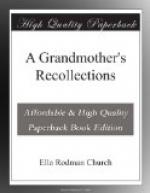I looked up, and fairly trembled with terror and dismay. There stood Mr. Eylton, gazing on me in surprise, as if quite at a loss what to make of the circumstance; but as his eye fell upon the picture, I noticed that an expression of sadness crossed his countenance. Not knowing what to do with myself, and almost ready to sink through the floor with shame, I stood with bowed head and burning cheeks, the very picture of mortification. But there was no trace of anger in Mr. Eylton’s tone, as, kindly taking me by the hand, he drew me towards him and asked me my name. I answered as well as I could; and still holding the picture, remained in silent consternation. Mr. Eylton took it from my hand, and sighed as he bent a deep, loving gaze upon the fair face.
Prompted by a sudden impulse, I raised my eyes to his, as I enquired: “Can you tell me where that little girl is now? I should so like to see her!”
“In heaven, I trust,” replied Mr. Eylton, while his voice slightly faltered, and a tear stood in his eye. “She was my daughter, Amy—she died some years ago, when very young.”
I felt almost ready to cry myself, when told that she was dead, and gazed lingeringly upon the portrait as Mr. Eylton closed the box; and placing it in the drawer, he returned to me again.
“But, my dear child,” said he suddenly, “Why did you open the drawer? Do you not know that it was extremely improper?”
“I did so want to see what was in it!” was my rejoinder.
Mr. Eylton seemed puzzled at first by this reply; but probably perceiving that I had been too much left to myself, he proceeded to explain, in clear and concise words, the nature and tendency of my fault. “This curiosity, my dear child, is an improper state of feeling which should not be indulged in. Suppose,” continued he, “that on looking into this drawer, you had perceived some article which you immediately felt a great desire to possess; yielding to the temptation of curiosity would thus lead to the sin of covetousness, and perhaps the crime of theft might be also added. You would reason with yourself that no one had seen you open the drawer, and forgetting the all-seeing Eye which never slumbers, you might conclude that no one would know you took the article which did not belong to you.”




